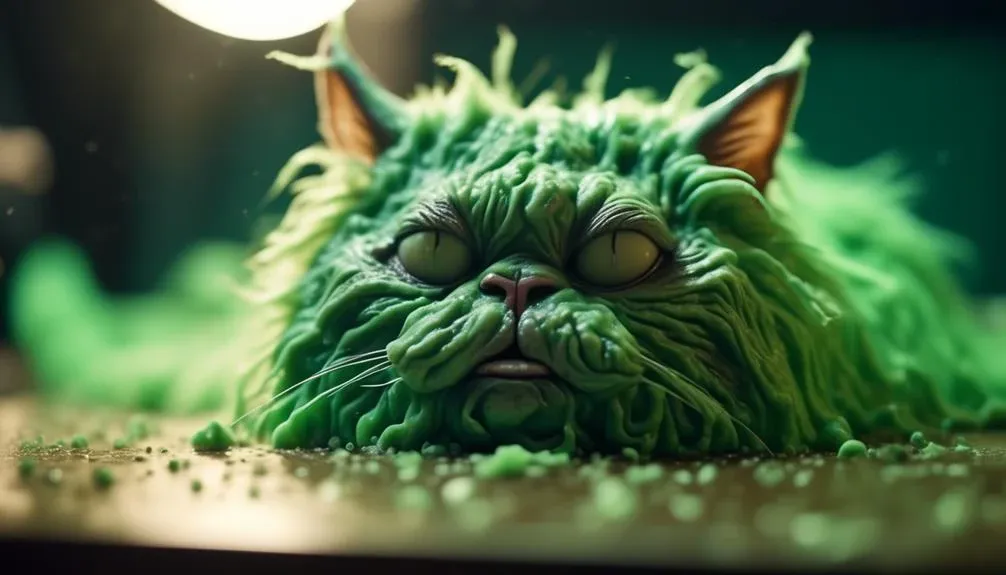The Best Fluffy Pancakes recipe you will fall in love with. Full of tips and tricks to help you make the best pancakes.

Welcome to the intriguing world of feline odors, where we embark on a journey to uncover the secrets behind a smelly cat.
While cats are renowned for their cleanliness, a lingering and unpleasant stench can be indicative of underlying issues that warrant our attention.
In this discussion, we will explore the potential causes of a smelly cat, ranging from digestive problems to inadequate grooming.
By delving into these mysteries, we aim to shed light on the reasons behind this phenomenon and provide insight into how to address it effectively.
So, brace yourself for a captivating exploration into the fascinating world of feline aromas.
Key Takeaways
- Cats can have a bad odor due to various reasons such as digestive problems, mouth issues, skin infections, or lack of grooming.
- Regular cleaning and vacuuming, using natural deodorizers, and investing in air purifiers can help keep your home free from pet odors.
- Cats are generally not smelly animals due to their cleanliness and frequent grooming, but the smell of the litter box or accidents can cause lingering odors.
- If a cat smells bad, it could be due to getting into something dirty or underlying health conditions, and seeking veterinary advice is important for proper diagnosis and treatment.
Potential Reasons for Smelly Cats
There are several potential reasons for the unpleasant odor emanating from a cat, ranging from digestive problems to skin infections and inadequate grooming.
Cats can experience digestive issues such as diarrhea, constipation, gas, and anal gland problems, which can contribute to a foul odor. Mouth issues, such as advanced dental disease, mouth ulcers, growths, or lesions, can also lead to a smelly cat.
In addition, skin infections or wounds, characterized by overgrowth of fungi or bacteria, red and inflamed skin, excessive grooming, greasy coat, or hair loss, can cause an unpleasant odor.
Furthermore, a lack of grooming or ineffective grooming can result in a buildup of dirt and oils on the cat's fur, contributing to the smell.
To address these issues, remedies for smelly cats may include addressing the underlying health problems, improving grooming habits, and seeking veterinary advice for proper diagnosis and treatment.
Tips to Eliminate Cat Odors in Your Home
Addressing the issue of smelly cats requires not only identifying the potential reasons behind the odor but also implementing effective tips to eliminate cat odors in your home.
There are two main methods for eliminating cat odors: natural and chemical.
Natural methods involve using substances like baking soda, hydrogen peroxide, white vinegar, or lemon as deodorizers. These can be sprinkled on carpets, furniture, or even added to the litter box to neutralize odors.
Chemical methods include the use of enzymatic cleaners that break down odors at the source. Additionally, investing in an air purifier with a HEPA filter and activated carbon filter can help remove cat odors from the air.
To prevent cat odors in the first place, it is important to keep your home clean and vacuum regularly to remove excess cat hair and lingering odors.
Why Cats Are Generally Not Smelly Animals
Cats are renowned for their cleanliness and self-grooming habits, which contribute to their overall lack of strong odor. Regular grooming is one of the key factors that help maintain their fresh scent. When cats groom themselves, they remove dirt, debris, and excess oils from their fur, preventing any buildup that could cause unpleasant odors.
Additionally, grooming spreads natural oils evenly across their coat, which helps keep it soft and clean.
Another aspect of maintaining a clean-smelling cat is ensuring a clean litter box. Regularly scooping and replacing the litter not only prevents the accumulation of waste, but it also helps to minimize any lingering odors. Keeping the litter box in a well-ventilated area and using odor-absorbing litter can further help maintain a fresh environment.
Common Causes of Smelly Cats
Regular grooming and a clean litter box are important factors in maintaining a generally odor-free feline companion. However, there are certain common causes that can contribute to a smelly cat.
Some potential causes of chronic bad odor in cats include digestive problems such as diarrhea, constipation, gas, and anal gland issues.
Mouth issues like advanced dental disease, mouth ulcers, growths, and lesions can also result in a foul smell.
Additionally, skin infections or wounds characterized by overgrowth of fungi or bacteria, red and inflamed skin, excessive grooming, greasy coat, and hair loss can contribute to an unpleasant odor.
Lack of grooming or ineffective grooming, as well as ear infections, can also be factors.
To prevent and treat cat skin infections, it is important to seek veterinary advice for proper diagnosis and treatment.
Importance of Proper Cat Care
Proper cat care is essential for ensuring the overall well-being and health of our feline companions.
One important aspect of cat care is regular grooming. Regular grooming helps to keep cats clean and free from unpleasant odors. It also allows for early detection of any skin infections or wounds that may be causing the bad smell.
Additionally, addressing health conditions is crucial in maintaining a pleasant scent for our cats. If a cat has a persistent bad odor, it may be a sign of an underlying health issue that needs to be addressed by a veterinarian.
Conclusion
In conclusion, understanding and addressing the reasons behind a smelly cat is crucial for their overall well-being. By identifying potential health issues or hygiene problems and taking appropriate measures, we can eliminate unpleasant odors and ensure a comfortable living environment for both our feline companions and ourselves.
Proper cat care plays a vital role in maintaining their health and happiness. Just as a well-tended garden blossoms with vibrant colors, a well-cared-for cat radiates with a pleasant scent and contentment.








